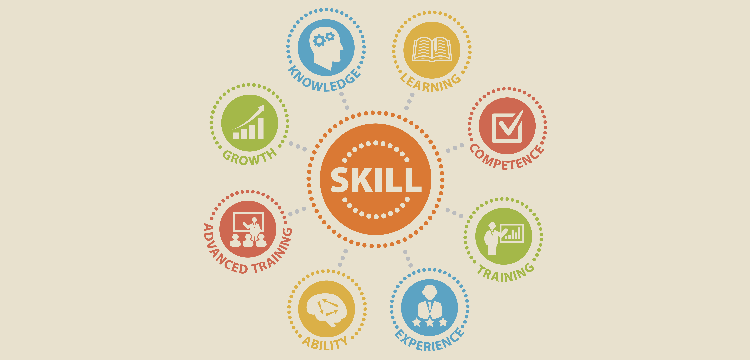
Building Skills Employers Want
Most people never stop learning. Learning new things is often a major part of searching for a job or working at your current one. For example, people working in the technology industry often have to expand and update their skills because technology is constantly evolving, which is why it is important to be adaptable.
Workplace "soft skills," such as communication or social skills, are not always taught in school. These skills need to be practiced because they're valuable for doing well at any job.
Overall, learning and practicing the skills employers want can make you a more flexible employee. It may open you up to a wider range of job opportunities. Whether you're a college grad setting out for the first time or an established professional, it is important to learn and practice in-demand job skills.
Examples of Skills
So, what exact skills are employers looking for? To help answer this question, United Way of Adams County created a listing of skills below. These skills have been backed up by 30 local employers, so the list is without a doubt a good place to start!
The skills are placed into three categories: Pre-Employment, Foundational, and High Performance. Here is a brief look at these categories to help get you started:
Pre-Employment Skills
When you start applying for jobs, make sure you're prepared for your career! No matter what job you're trying to get, the skills below will be valuable. Make sure you have worked on all of the following before you start your job search:1
- Job seeking skills
- Personal preparedness (Alcohol and Drug-Free, Hygiene, Health/Wellness)
- Professionalism/Appearance/Attendance
- Self-esteem
- Teamwork skills
- Math/Computation skills
- Computer skills
- Digital/social media etiquette.
- Listening skills
Foundational Skills
Once you've settled into a career, you can practice the foundational skills of being a good employee:2
- Ability to adapt
- Citizenship
- English communication skills (oral)
- Goal setting
- Positive attitude
- Reading and understanding material
- Time management
- Work ethic
High Performance Skills
These skills are typically used for long-term professional development. Practicing these high performance skills will help you grow and become an even better employee.
Once you've mastered the above skills, you can start focusing on the following: 3
- Creativity
- Critical thinking
- Initiative
- Innovation.
- Leadership
- Lifelong learning
- Problem solving
- Reasoning/using logic
- Team building
- Technological skills
- Written communication skills
- Business ethics
- Business acumen and experience
Ways to Build Your Skills
You can start learning about and building your skills on this very website! Illinois workNet provides a wealth of resources and tools that give guidance on a variety of topics. For example, try checking out our articles on Marketing Your Skills, Digital Literacy Guide, Job Skills Guides, and the Resume Writing Guide for some insight into topics such as:
- Looking for a job
- Resume writing
- Cover letters
- Job interview skills
Additionally, we curate external resources if you're looking for even more workNet-approved material. You can find these on the Job Qualification Resources page or on our IOER library.
Once you're ready to build your skills, take a look at the approaches below:
Illinois workNet Resume Builder Tools
You can use this set of tools to create job search materials like resumes, cover letters, and portfolios. You can also use it to practice your interviewing skills. Once you've saved these materials in your account, you can share them with others to get feedback.
You can find these tools by logging into your account and clicking "Resumes" under the My Dashboard icon.
If you live in Adams County, you can easily access this online tool. Inspire Works discusses employer needs. If you're a student, parent, job seeker, educator, employer, or career coach, you may be able to make use of this tool. For more info about Inspire Works, visit the link above.
Community Based Organizations (CBOs)
CBOs are non-profit organizations dedicated to improving the quality of life for residents in a community. They may be focused on areas such as education, health care, environment, or disability services.
If you're interested in learning about programs offered by CBOs, use our Service Finder to locate them.
Technical Training Programs
A traditional education isn't the only option for career training. In fact, there are many different routes to prepare for a job, especially if you are trying to get into a technical or vocational field.
If you're interested in finding training, check out our Training Program search tool.
eLearning
Several websites offer free or low-cost online courses on everything you could possibly imagine. These courses are sometimes called Massive Open Online Courses, or MOOCs. Many of them are aimed for employees looking to expand their skillset. Such sites include Coursera, Udemy, edX, and Udacity. You can also find eLearning sites aimed toward specific fields. For example, Lynda.com focuses on software, creative, and business skills.4
Also, ACT offers online "WorkKeys assessments" that evaluate job-related skills. To learn more about these types of skills and assessments and to sign up, click here.
Sources
Related Resources

Math.com: The World of Math Online

Mathematics, Reading, Science, Writing Scenarios - Foundation Level

Alison: A new world of free certified learning

mySkills myFuture

Career Advancement Scenarios - Management Level

Career Advancement Scenarios - Foundation Level

Problem Solving Scenarios - Management Level

Problem Solving Scenarios - Foundation Level

Positive Attitude Scenarios - Management Level
